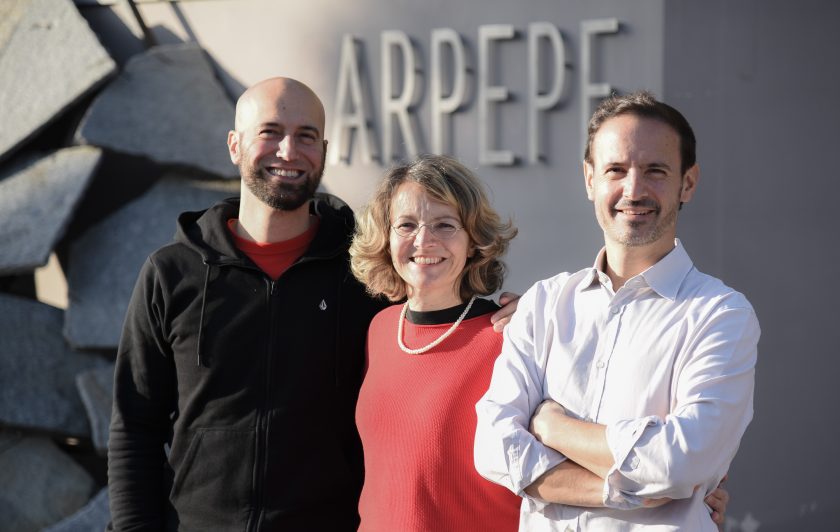2016 ARPEPE Rosso di Valtellina MAGNUM
This is alpine Nebbiolo like you’ve never had before — finessed, smooth, the more delicate side of the grape made famous for its power in Barolo. This bottling is from the 5th generation Ar.Pe.Pe estate in northern Italy’s Valtellina, Lombardy (on the border with Switzerland).
Sustainable farming practices and 4,000 cases produced annually.
- Tasting Notes strawberry, red cherry, hibiscus tea, white pepper, peppermint, leather
- Variety 100% Chiavennasca (Nebbiolo)
- Region Italy, Lombardy
- Volume 1.5L
- Alcohol Volume 12.5%
- Table Talk The terraced vineyards of ARPEPE are tucked in between the Orobic and Retic Alps just south of the Italian-Swiss border.

“These wines from ARPEPE (an abbreviation of founder Arturo Pelizzatti Perego’s initials) are among the most impressive I tasted… From top to bottom, the wines are deserving of serious attention. The super-traditional style will leave lovers of translucent Nebbiolo weak at the knees… Perhaps most importantly, ARPEPE shows just how pedigreed the wines of Valtellina can be.” — Antonio Galloni, Vinous
Tucked in between the Orobic and Retic Alps just south of the Italian-Swiss border, you’ll find the terraced vineyards of ARPEPE. At the helm of this storied estate, located in the Grumello subzone of Valtellina in Lombardy, is the fifth generation of the Pelizzatti Perego family. The roots of this blue-chip estate go back to the 1860s, when the current generation’s great-great-grandfather Giovanni founded a successful winery in the area, then known only as “Pelizzatti.” Over 150 years of history have passed since then, including the dark days of the 1970s during which the current generation’s grandfather fell ill, and the family was forced to sell the Pelizzatti brand along with some of their vineyards. The more recent history of the estate is an almost deus-ex-machina turn of events: the family re-founded their company under the ARPEPE label in 1984, got back many of their proprietary vineyards from renters, and were able to reclaim their cellar in Grumello. Today, ARPEPE is widely recognized as the single best producer in the appellation (as well as a benchmark producer of Nebbiolo in general) and we couldn’t be more thrilled to bring them to our customers.
Related Items
-
2022 Ben Haines Yarra Yarra Valley Red Blend
$35.00A blend of fruit from the Pyrenees, Grampians and Yarra Valley – this is the perfect “lighter” red for winter. Savory, spicy and vibrant this food-friendly wine will pair nicely with roasted veggie dishes, pork, or lamb gyros.
Organic/Biodynamic farming practices, family-owned, hand-harvested, native yeast fermentation, unfined/unfiltered and only 600 cased produced.
-
2023 Gilgal Golan Heights Winery Chardonnay
$26.00Fruit-forward and expressive, this Gigal Chardonnay is a reflection of the exceptional Mediterranean climate and growing conditions of the Galilee. This easygoing, approachable wine is sure to please everyone. Pair this wine with pan-seared red snapper with a lemon and caper sauce, roasted chicken with pears, or a creamy vegan mushroom risotto.
Sustainable farming practices. Fermented in stainless steel tanks, aged briefly in French oak. Kosher Certified, Kosher for Passover.
-
2022 Domaine Caroline Bellavoine Bourgogne Rouge
$35.00Caroline Bellavoine is the talk of the town. Her tiny production of old-vine Pinot Noir from the lesser-known Côtes du Couchois is pure, rustic, and deeply expressive of its unique terroir. It’s old-school Burgundy through and through – seriously complex and not for the faint of heart! Decant for 1 hour before enjoying.
Organic farming practices, native yeast fermentation, unfined/unfiltered, aged for 18 months in French oak barrels and only 150 cases produced annually.
-
2023 Scribe Carneros Pinot Noir
$55.00Scribe, a pioneer of terroir-driven winemaking in Sonoma, makes one of our all-time favorite Pinots. Invite a few close friends over for an intimate dinner, light some candles, play some jazz and serve wild mushroom risotto topped with fish, chicken or as is! This Pinot will go with it all.
Organic farming practices, hand-harvested, native yeast fermentation (30% whole cluster), and aged 7 months in neutral oak with minimal intervention.






